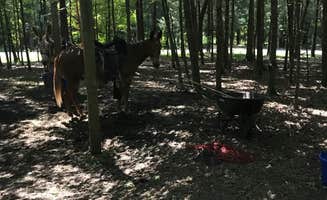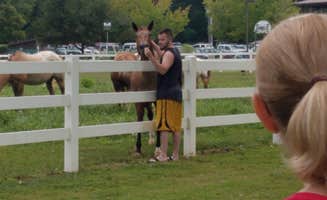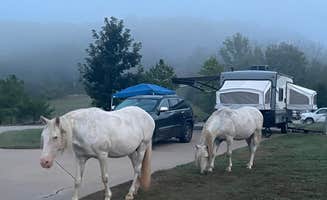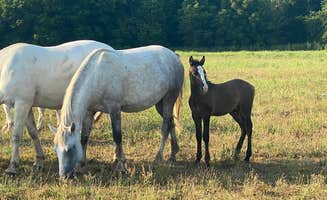Horse campgrounds near Arcadia, Missouri offer primitive to developed camping options within the Mark Twain National Forest. The region sits at elevations ranging from 500-1,200 feet with mixed hardwood forests and clear streams. Winter camping temperatures typically drop to 20-30°F while summer months average 85-95°F with high humidity.
What to Do
Trail riding networks: Hazel Creek Campground offers access to equestrian trails where you can ride through densely wooded areas. "Enjoyed my stay and hikes on the equestrian trails. Hazel creek is a picturesque crystal clear creek that is near the campground, featuring tons of wildlife and peaceful views," notes Sterling M.
Swimming holes: Bearcat Getaway provides access to the Black River for cooling off. "Nice float on the Black River. Cool water and beach to sit and watch the floaters go by in as well!" reports Jennifer G.
Fishing spots: Local creeks and rivers offer bass, bluegill and catfish. Many campgrounds have direct water access. "Great river access, nice little store, good price!!" says Matt M. about Sam A. Baker State Park Campground.
What Campers Like
Secluded campsites: Equestrian-oriented campgrounds provide larger, more spaced-out sites. At Hazel Creek, "The campsites are flat and clean gravel fill or dirt, the grass is usually tamed, each with a campfire ring with a grill and a picnic table and lantern pole. Densely wooded, full shade," according to Sterling M.
Creek access: Many horse-friendly campgrounds feature water access for both riders and horses. "Beautiful view. You can sit in the cool clear water and relax. Great place for kids. Park is well maintained," notes Kevin B. about Sam A. Baker State Park.
Weekend entertainment: Bearcat Getaway offers organized activities and music for evening entertainment. "They have live music and food every weekend, sometimes it can get a little loud so if quiet camping is what you prefer, some sites may not be for you," warns Melody B.
What You Should Know
Campground differences: St. Joe State Park Campground has two distinct campgrounds with different atmospheres. "CG#2 is located about 2-3 [miles] away from the main campground, this includes the shower house and main bathrooms. There is no shower house at CG#2," explains Olivia S.
Road conditions: Forest Service roads to horse campgrounds can be challenging. For Hazel Creek, "The access road was rough but my wife's tiny compact car didn't have any trouble, but I'm sure it's a mess when wet," shares Sterling M.
Seasonal considerations: Spring and fall provide the most comfortable riding conditions. Weekdays offer significantly less crowded experiences at most equestrian campgrounds compared to busy summer weekends and holidays.
Tips for Camping with Families
Swimming beaches: Echo Bluff State Park offers developed swimming areas suitable for children. "This campground has full amenities. Clean bathrooms and showers. Firewood available for purchase and even WiFi. It was a great place to take our kids!" recommends Stephanie W.
Wildlife viewing: Many campgrounds offer opportunities to spot local wildlife. At Echo Bluff, campers report seeing "wild horses as well" according to Sage W.
Facility quality: For families needing more facilities, state parks typically offer better amenities. "My family camps at Sam A Baker every year. It is clean and everyone there is friendly. They have a nice gift shop and some great places to swim," shares Emily J.
Tips from RVers
Site selection: Johnson's Shut-Ins State Park offers varying levels of hookups for RVs. "There are hookup sites as well as a primitive loop for tent camping. The cart provided was great to walk our gear down the trail to our site," explains Shelby B.
Spacing considerations: When bringing horses and RVs, St. Joe State Park Campground 2 accommodates these needs. "The campground 2 sites are set up for horses, something I know almost nothing about, but they make the sites larger to accommodate equestrian needs and that's nice," reports Grant M.
Weather preparation: During rainy seasons, pack extra leveling blocks and ground protection as many horse campgrounds have gravel or dirt surfaces that can become soft after rain. Sites with concrete pads are limited primarily to developed state parks.





